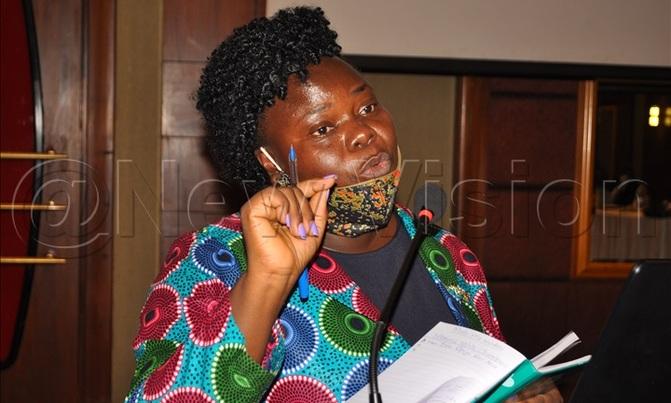Africa-Press – Uganda. HUMAN RIGHTS DAY
Every year the Human Rights Day is observed on 10 December, the day the United Nations General Assembly in 1948 adopted the Universal Declaration of Human Rights (UDHR).
The UDHR is a milestone document that proclaims the undeniable rights which everyone is entitled to as a human being – regardless of race, colour, religion, sex, language, political or other opinions, national or social origin, property, birth or other status.
However, Uganda has continued to rank lowly when it comes to upholding human rights.
According to Human Rights Watch, violations of freedom of association, assembly, and expression heightened last year (2019) as new regulations restricting online activities and stifling independent media were introduced in the country.
Political opponents to government were also arrested and security forces blocked political and student rallies.
“These restrictions on expression and assembly, arbitrary detentions and prosecutions of outspoken critics, and the government’s failure to ensure accountability for past abuses do not bode well for the 2021 general elections,” said Human Right Watch.
With the election campaigns now fully on, security forces have come under accusation of using excessive force to disperse crowds and violating the human rights of Ugandans, after presidential candidates were asked to avoid holding mass rallies to protect Ugandans from the Coronavirus (COVID-19) pandemic that continues to rage across the world.
Barbara Babweteera, the Deputy Executive Director of the Cross-Cultural Foundation of Uganda (CCFU) says since 2019 Uganda has registered a lot of progress in protecting human rights but at the same time we have had some challenges regarding the respect of the same human rights in certain spheres.
“So it’s a step forward and another step backwards. The year 2020 has posed several challenges starting with the coronavirus (COVID-19) pandemic that has wreaked havoc across the world. It has not spared Uganda either, we have lived through tough times and tougher times are yet to come.”
“This year alone has seen several human rights violations as a result of the political situation and the elections campaigns going on.”
“We have seen nasty scenes where people have been brutalized, people have been denied the rights to be heard and to express themselves but some of it is as a result of the need to stop the spread of COVID-19 but at the same time, there is a need for certain rights to be respected,” she said.
The focus of COVID-19 and the damaging effect it has had on rights
This year the global theme to mark International Human Rights Day is; “Recover Better – Stand Up for Human Rights”.
According to the United Nations, the COVID-19 crisis has been fueled by deepening poverty, rising inequalities, structural and entrenched discrimination and other gaps in human rights protection.
Statistics has it that over 6000 girls got pregnant during the COVID-19 lockdown period.
“We have seen several rights violations especially for the young girls getting pregnant.”
“We have also seen several indigenous groups come out to speak about how their rights were trampled upon during the COVID-19 period. The good is there but there are gaps for us to fill out,” Babweteera said.
“On the International Human Rights Day, we need to reflect upon the people whose rights have been violated including the young girls and women, plus the indigenous minority tribes who have been subjected to getting and learning bout COVID-19 through other people’s languages,” she added.
Babweteera, said the Cross-Cultural Foundation of Uganda conducted a survey on the indigenous minority groups and shared the information of the findings with district leaders to pay closer attention to their indigenous minority tribes and give them the necessary support and respect their human rights.
“They have the right to information, access treatment, to be heard and get basic services like other communities have been getting.”
She disclosed where food was distributed during COVID-19 lockdown the minority groups were easily forgotten.
“There is need to stand up for the right of everyone by those in leadership and also recover better for the rights of the minority,” Babweteera added.
How cultural leaders can play a role in promoting human rights
Often culture is looked at as negative as what is perpetuating the violations of human rights of women and girls but there is a lot that culture can play to promote and prevent the violation of women and girls and protect human rights, said Babweteera.
She said cultural or traditional leaders should use the cultural resources they have in a positive way to contribute to the elimination of child marriages, teenage pregnancies, and contribute to ending violence against women using the available principles values and practices that have been defined by culture that can be used to stop human rights violations, especially against girls and women.
“On such a day, we need to also reflect and look at how much as a country have we stopped to protect our cultural rights as well because they can contribute a lot towards the protection of women and girls towards economic rights towards the preservation of our history.”
“It’s good that we always pause and reflect pick what is good in our culture and use it to build a better country,” Babweteera added
She said the other way for the country to recover better and stand up for human rights is for our cultural leaders, cultural institutions and government leaders to stop tendencies of corruption.
Babweteera explained corruption has never been part of our culture and its what has killed institutions from operating the way they are supposed to and trampled upon the rights of Ugandans.
“To recover better let us stop corruption, let us be there for one another and let us together stand up for the right of every person in our communities.”
She said Cultural leaders are listened to and respected by many people and during this election period, they can promote social cohesion between the different camps of presidential candidates, encourage their subjects to respect the lives of one another, maintain peace and be safe.
“They need to stand up spread the word encourage their subjects to wear masks, maintain social distance and seek medical attention when feeling unwell, to also promote health rights,” she said.
According to the UN, human rights are at the heart of the Sustainable Development Goals (SDGs), and in the absence of human dignity, we cannot hope to drive sustainable development.
“We will reach our common global goals only if we can create equal opportunities for all, address the failures exposed and exploited by COVID-19, and apply human rights standards to tackle entrenched, systematic, and intergenerational inequalities, exclusion and discrimination,” stated the UN.






